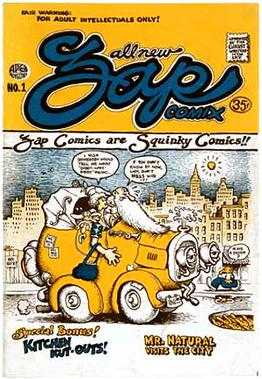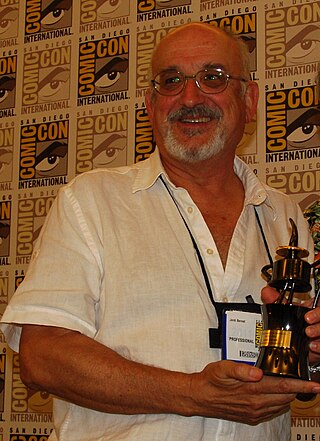
A comic book, comic-magazine or simply 'comic', is a publication that consists of comics art in the form of sequential juxtaposed panels that represent individual scenes. Panels are often accompanied by descriptive prose and written narrative, usually dialogue contained in word balloons emblematic of the comics art form.

Manga are comics or graphic novels originating from Japan. Most manga conform to a style developed in Japan in the late 19th century, and the form has a long history in earlier Japanese art. The term manga is used in Japan to refer to both comics and cartooning. Outside of Japan, the word is typically used to refer to comics originally published in Japan.
Marvel Comics is a New York City-based comic book publisher, a property of The Walt Disney Company since December 31, 2009, and a subsidiary of Disney Publishing Worldwide since March 2023. Marvel was founded in 1939 by Martin Goodman as Timely Comics, and by 1951 had generally become known as Atlas Comics. The Marvel era began in August 1961 with the launch of The Fantastic Four and other superhero titles created by Stan Lee, Jack Kirby, Steve Ditko, and numerous others. The Marvel brand, which had been used over the years and decades, was solidified as the company's primary brand.
Bandes dessinées, abbreviated BDs and also referred to as Franco-Belgian comics, are comics that are usually originally in French and created for readership in France and Belgium. These countries have a long tradition in comics, separate from that of English-language comics. Belgium is a mostly bilingual country, and comics originally in Dutch are culturally a part of the world of bandes dessinées, even if the translation from French to Dutch far outweighs the other direction.

Underground comix are small press or self-published comic books that are often socially relevant or satirical in nature. They differ from mainstream comics in depicting content forbidden to mainstream publications by the Comics Code Authority, including explicit drug use, sexuality, and violence. They were most popular in the United States in the late 1960s and 1970s, and in the United Kingdom in the 1970s.
Image Comics is an American comic book publisher and is the third largest direct market comic book and graphic novel publisher in the industry by market share. Its best-known publications include Spawn, The Walking Dead, Kick-Ass, Invincible, Jupiter's Legacy, Witchblade, The Maxx, Savage Dragon, Bone, Saga, Radiant Black and Stray Dogs.

Fantagraphics is an American publisher of alternative comics, classic comic strip anthologies, manga, magazines, graphic novels, and (formerly) the erotic Eros Comix imprint.

Maurilio Manara, known professionally as Milo Manara, is an Italian comic book writer and artist.
Glénat Éditions SA is a French publisher with its head office in Grenoble. Their products include comic albums and manga in France, Benelux, and in the past Spain; it was founded by Jacques Glénat. The Benelux subsidiary, Glénat Benelux N.V., is located in Brussels, Belgium. The Switzerland subsidiary, Glénat Éditions (Suisse) SA, has its headquarters in Nyon. The Spanish subsidiary had its head office in Barcelona.
Panini Comics is an Italian comic book publisher. A division of Panini Group, which also produces collectible stickers, it is headquartered in Modena, Italy. The company publishes comic books in Argentina, Brazil, Chile, France, Germany, Hungary, Italy, Mexico, Peru, Portugal, Spain and the United Kingdom, as well as manga in several non-English-speaking countries through the Planet Manga publishing division.
Warren Publishing was an American magazine company founded by James Warren, who published his first magazines in 1957 and continued in the business for decades. Magazines published by Warren include After Hours, Creepy, Eerie, Famous Monsters of Filmland, Help!, and Vampirella.
Catalan Communications was a New York City publishing company that existed from 1983 to 1991. Operated by Bernd Metz, it mainly focused on English-language translations of European graphic novels presented in a series of high-quality trade paperbacks, or rather comic albums, a European book format American comic book readers were at the time not accustomed to, neither for their physical dimensions nor for their contents aimed at a mature readership, and who at the time had the tendency to use the diminutive term "Euro-comics" to refer to the then-unfamiliar format.

Jordi Bernet Cussó is a Spanish comics artist, best known for the gangster comics series Torpedo and for American weird western comic book Jonah Hex.
Manga, or comics, have appeared in translation in many different languages in different countries. France represents about 40% of the European comic market and in 2011, manga represented 40% of the comics being published in the country. In 2007, 70% of the comics sold in Germany were manga. In the United States, manga comprises a small industry, especially when compared to the inroads that Japanese animation or Japanese video games have made in the USA. One example of a manga publisher in the United States, VIZ Media, functions as the American affiliate of the Japanese publishers Shogakukan and Shueisha. Though the United Kingdom has fewer manga publishers than the U.S., most manga sold in the United Kingdom are published by U.S. publishing companies like Viz Media and Kodansha Comics which are in turn owned by their Japanese counterparts. Alongside the United Kingdom, the U.S. manga publishers also sell their English translated manga in other English speaking nations like Canada, Australia and New Zealand with manga being quite popular in Australia compared to other English speaking countries.

Editorial Planeta-DeAgostini is a Hispano-Italian publisher and a subsidiary of Grupo Planeta and De Agostini specializing in collectable books, sold periodically in pieces through newsstands (partworks). It has its headquarters in Barcelona.

Norma Editorial is a Spanish comics publisher, with its headquarters in Barcelona.

Western comics is a comics genre usually depicting the American Old West frontier and typically set during the late nineteenth century. The term is generally associated with an American comic books genre published from the late 1940s through the 1950s. Western comics of the period typically featured dramatic scripts about cowboys, gunfighters, lawmen, bounty hunters, outlaws, and Native Americans. Accompanying artwork depicted a rural America populated with such iconic images as guns, cowboy hats, vests, horses, saloons, ranches, and deserts, contemporaneous with the setting.

Penguin Random House Limited is a British-American multinational conglomerate publishing company formed on July 1, 2013, with the merger of Penguin Books and Random House. Penguin Books was originally founded in 1935 and Random House was founded in 1927. It has more than 300 publishing imprints. Along with Simon & Schuster, Hachette, HarperCollins and Macmillan Publishers, Penguin Random House is considered one of the 'Big Five' English language publishers.
Ediciones B is a Spanish publisher, which currently operates as a division of Penguin Random House. Ediciones B is headquartered in Madrid and Barcelona, Spain; with branches throughout Latin America. It was established in 1986, but has its origins in El Gato Negro (1910) and Editorial Bruguera (1940).








